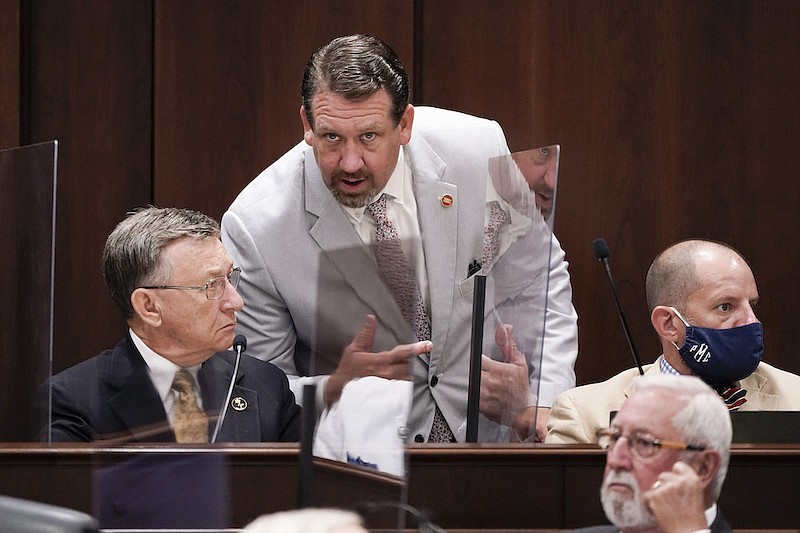NASHVILLE - With some Tennessee lawmakers raising objections to being sidelined as Gov. Bill Lee issues executive orders addressing the COVID-19 pandemic, a special legislative panel met for the first time Thursday to discuss how they can provide more oversight and possibly impose new restrictions on Lee's use of emergency powers.
"My concern is moving forward and how do we maintain the balance of power in the state of Tennessee even in the midst of a pandemic," said Rep. Dan Howell, a Georgetown Republican, as the recently created Ad Hoc Committee to Study Emergency Powers held its first meeting. "This is very important work for the people of Tennessee and our representative form of government."
What the COVID-19 crisis has done, Howell said, is uncover "some unintentional consequences" in an emergency powers act approved by the General Assembly giving governors more leeway in how they address crises.
Some Republicans objected to Lee's early order requiring Tennesseans to remain largely at home except for essential business such as food shopping.
Similar objections were raised about additional orders that shut down many businesses for several weeks with exceptions for grocery stores, convenience stores, gas stations and the like. When the Republican governor moved to lifted those and other orders, he drew heat from physicians and others warning it would allow the disease to spread, which it did.
Now Lee is coming under fire for looking at extending unemployment benefits for jobless Tennesseans, using federal dollars sent to states to help them and residents deal with various impacts of the pandemic.
The ad hoc panel heard from legislative attorneys as well as experts who told lawmakers that the Tennessee Constitution, court rulings and especially state laws grant governors, including Lee, wide authority, and that his executive orders on the coronavirus have the effect of law.
Former U.S. Attorney General Alberto Gonzales, dean at Nashville's Belmont University College of Law, and former Tennessee Supreme Court Chief Justice William Koch told legislators they need to tread carefully.
Gonzales said there is "not really a question" over whether Lee has the authority to do what he's done.
"Perhaps a better use, with all due respect, of the committee's time is to look at what limitations should there be," he said.
"I think it's important for the governor, the mayor or the president of the United States to have maximum flexibility to respond to a crisis," added Gonzales, who was with President George W. Bush on 9/11 when terrorists struck New York City's World Trade Center and the Pentagon in Washington, D.C., with hijacked planes. "It's really impossible to legislate in anticipation of anything that might happen."
But Gonzales said that "having said that, in return I think it's not unreasonable for the legislature to expect there be a full accounting for what the chief executive has done and why."
Noting it's appropriate to learn how a chief executive "chooses to respond to a crisis," Gonzales said, "I wouldn't give total flexibility, but a lot of flexibility.
"But in return for that," he said, "I think it's perfectly appropriate, I'm comfortable defending the notion that as legislators you have an obligation to the citizens of Tennessee to understand why these decisions were made certainly if we're talking about the spending of significant amounts of state dollars to have an understanding of that."
Some of Lee's fellow Republicans in the legislature complain the governor hasn't done enough of that.
Lee later pointed out to reporters that the legislature "is actually part of the process of the spending. All of the spending that we're doing regarding COVID is a part of the strategy of the Financial Stimulus Accountability Group, which includes both speakers, the comptroller, two Democrats and two Republicans from the legislature."
Those meetings "are actually public as well as the plan for spending. So yes, the report actually is public now," he said.
Asked about being more transparent on his other actions, such as lifting the closer-to-home order, Lee said, "I think the executive orders that are not attached to financial costs, those are just what they are. Those are decisions that are made and explained in each executive order.
"Our office has been working with that ad hoc committee to provide information so they can understand We're working mutually together to provide them information so they can make the decisions that they need to make going forward."
The governor said of legislators that "we want to communicate as much as possible. There's 132 legislators. Making sure they all know when information is coming out is important, it's difficult we've actually been talking about that for a couple months, how can we better streamline the information flow."
While some lawmakers argued the COVID-19 pandemic is unprecedented, former Chief Justice Koch said disease outbreaks, state actions, lawsuits and U.S. Supreme Court decisions actually have lengthy histories.
He cited two previous epidemics, one a smallpox outbreak in Memphis that spread from there as far as Chattanooga as people fled, eventually killing 5,100. Another was the 1918-1919 flu pandemic that left 7,700 Tennesseans dead.
"Laws were put in place during these particular episodes by the General Assembly to deal with those problems created there," Koch said. "I suggest that you look at those laws to see what your forebears did in response to these pandemics."
Moreover, Koch said, the answers to questions about powers granted to the executive branch are contained not only in the Tennessee Constitution but in state law and common law.
While both the executive and legislative branches of government are trustees of citizens, Koch said, "we know that the executive can act more quickly and move with more force than other branches. And I'm including judiciary in that. The governor simply acts more quickly."
In the past, Koch said, that has "dictated giving the governor powers to be able to marshal the state's response" when an epidemic occurs.
Contact Andy Sher at asher@timesfreepress.com or 615-255-0550. Follow him on Twitter @AndySher1.
Contact Elizabeth Fite at efite@timesfreepress.com.
